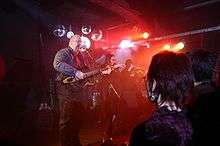Neofolk
Neofolk, also known as post-industrial or apocalyptic folk, is a form of experimental music blending elements of folk and industrial music, which emerged in punk rock circles in the 1980s.[1] Neofolk may either be solely acoustic or combine acoustic folk instrumentation with various other sounds.[2]
| Neofolk | |
|---|---|
| Other names |
|
| Stylistic origins | |
| Cultural origins | 1980s, England |
| Derivative forms | Martial industrial |
(complete list) | |
| Other topics | |
History

The term "neofolk" originates from esoteric music circles who started using the term in the late 20th century to describe music influenced by musicians such as Douglas Pearce (Death In June), Tony Wakeford (Sol Invictus) and David Tibet (Current 93).[2]
Anglo-American folk music with similar sounds and themes to neofolk existed as far back as the 1960s.[2] Folk musicians such as Vulcan's Hammer, Changes, Leonard Cohen, and Comus could be considered harbingers of the sound that later influenced the neofolk artists. Also the later explorations of Velvet Underground's band members, specifically those of Lou Reed, have been called a major influence on what later became neofolk.[1]
Culture
A majority of artists within the neofolk genre focus on archaic, cultural and literary references. Local traditions and indigenous beliefs tend to be portrayed heavily as well as esoteric and historical topics.[2]
Various forms of neopaganism and occultism play a part in the themes touched upon by many modern and original neofolk artists. Runic alphabets, heathen European sites and other means of expressing an interest in the ancient and ancestral occur often in neofolk music. Aesthetically, references to this subject occur within band names, album artwork, clothing and various other means of artistic expression. This has led to some forefathers of the genre and current artists within the genre attributing it to being an aspect of a broader neopagan revival.[3] Many such bands refer to this revival in metaphor, often borrowing terms such as Ernst Jünger's Waldgäng and using Fascist symbolism and slogans, this has led to an association of the genre with the far-right, though this is contested by fans.[4] As a result some bands have stated opposition to the perceived Fascist apologia and themes in the genre and the related genre of martial industrial.[5]
Related terms and styles
Apocalyptic folk
As a descriptor, apocalyptic folk predates neofolk and was used by David Tibet to describe the music of his band Current 93 during a period in the late 1980s and early 1990s.[6] Initially, Tibet did not intend to imply connection with the folk music genre; rather, that Current 93 was made by "apocalyptic folk[s]": in other words, apocalyptic people.[7] Tibet and Current 93 produced some covers of traditional English folk songs, and Tibet himself was a great advocate for reclusive English folk singer Shirley Collins.[8]
Folk noir
Other vague terms sometimes used to describe artists of this genre include "dark folk" and "pagan folk". These terms are umbrella terms that also describe various other forms of unrelated music.
Martial industrial
Martial industrial or military pop is a genre that shares a lot in common with neofolk and developed very close to it.[9]
References
- Webb, Peter (2007). "Neo-Folk or Postindustrial Music". Exploring the Networked Worlds of Popular Music. Routledge. ISBN 9780415956581.
One milieu to develop out of Punk was the scene that later became known as either apocalyptic folk, postindustrial, or later neo-folk.
- Neumann-Braun, Klaus; Schmidt, Axel (2008). Die Welt der Gothics: Spielräume düster konnotierter Transzendenz [The World of the Goths: Scopes of a darkly-connoted Transcendence] (in German) (2nd ed.). VS Verlag für Sozialwissenschaften. p. 280. ISBN 3-531-15880-5.
- "I'm very happy about that because I see Death In June as part of a European cultural revival. I'm pleased that the Old Gods are being resurrected, for want of a better word. Old symbols. I feel very pleased that I am a part of that process and that I have had influence. At this stage in the game, so to speak, it's not false modesty to say that I am content with my influence." Powell, Erin. Interview with Douglas Pearce Archived 2007-10-18 at the Wayback Machine, 2005.
- Anton Shekhovtsov (2009) Apoliteic music: Neo-Folk, Martial Industrial and ‘metapolitical fascism’, Patterns of Prejudice, 43:5, 431-457, DOI: 10.1080/00313220903338990
- Kelly, Kim; Joyce, Colin (2018-08-21). "Unmasking Gaylord, Black Metal's Latest Anti-Fascist Enigma". Noisey. Retrieved 2019-04-19.
- Rehill, Anne (2009). The Apocalypse Is Everywhere: A Popular History of America's Favorite Nightmare. Greenwood Publishing. p. 205. ISBN 0-313-35438-3.
- "The Apocalyptic Visions of Current 93"
- "Folk singer Shirley Collins performs first show in 35 years". the Guardian. 2014-02-10. Retrieved 2020-05-06.
- Brill, Dunja. "Transgression ohne Queer – die Inszenierung martialischer Männlichkeit als 'Anti-Drag' in der Industrial- und Extreme Metal-Szene [Transgression without 'Queer' – the Staging of martial Masculinity as being 'Anti-Drag' in the Industrial and Extreme Metal Scene]". In Nagelschmidt, Ilse; Wojke, Kristin; Borrego, Britta (eds.). Interdisziplinäres Kolloquium zur Geschlechterforschung: Die Beiträge [Interdisciplinary Colloquium on Gender Research: the Contributions] (in German). Peter Lang. p. 133.
Further reading
- Anton Shekhovtsov, 'Apoliteic music: Neo-Folk, Martial Industrial and "metapolitical fascism"', Patterns of Prejudice, Vol. 43, No. 5 (December 2009), pp. 431–457.
- Peter Webb, Exploring the Networked Worlds of Popular Music: Milieu Cultures (New York: Routledge, 2007), ISBN 0-415-95658-7.
- Andreas Diesel und Dieter Gerten, Looking for Europe - Neofolk und Hintergründe (Zeltingen-Rachtig: Index-Verlag, 2005), ISBN 3-936878-02-1.